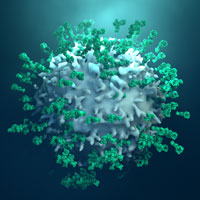Therapeutics
 HyAGuard: combatting inflammation and fibrosis in post-surgery glaucoma patients
HyAGuard: combatting inflammation and fibrosis in post-surgery glaucoma patients
HyAGaurd is a biodegradable depot formulation inserted under the conjunctiva which acts to reduce post-surgical scar tissue formation following glaucoma drainage surgeries. HyAGuard delivers anti-inflammatory and anti-fibrotic molecules in a controlled manner. to inhibit inflammation and fibrosis at key stages of the wound healing process, thereby eliminating the inefficiencies of patient-administered drops and reducing the numbers of repeat surgical procedures.
This technology is being commercialised by RCSI spin-out company LEP Biomedical.

Highly selective inhibitors of HDAC6 for the treatment of cancers and neurodegenerative disease
Researchers in RCSI and the Dana-Farber Cancer Institute have discovered a novel structural class of highly-selective HDAC6 inhibitors. These patented small molecules have a unique non-hydroxamic acid chemical structure and are >250-fold selective over the other HDACs. The lead compound BAS-2 has been shown to inhibit glycolysis in Triple Negative Breast Cancer Cells – a unique vulnerability independent of the mitochondrial apoptosis pathway which is one of the key drivers of chemoresistance. Further development of the chemistry has led to an additional patented series of potent HDAC6 PROTACS.
 Novel epigenetic biomarkers and targets for metastatic colorectal cancer
Novel epigenetic biomarkers and targets for metastatic colorectal cancer
Using an extensive proprietary epigenetic dataset, researchers at RCSI have developed a patented biomarker panel to identify patients with colorectal cancer who are at high risk of developing metastatic disease (mCRC) and a series of novel validated therapeutic targets. The team are seeking industry partners to co-develop this strategy of biomarker-led early intervention with directed therapies to help to improve outcomes for this high-risk group.
 ADAM22 and LGI1 mimetic peptide: A complete solution as a directed therapeutic strategy for endocrine related tumour metastasis
ADAM22 and LGI1 mimetic peptide: A complete solution as a directed therapeutic strategy for endocrine related tumour metastasis
ADAM22 is a novel therapeutic target for metastatic disease, with a peptide drug based on its natural ligand, LGI1. The technology compromises of a clinically validated and commercially ready immunohistochemical assay for the detection of ADAM22 in breast cancer tissue to be utilised as (i) as a biomarker for predicting the metastatic potential of breast tumours in endocrine treated breast cancer patients and (ii) as a companion diagnostic for a novel therapeutic (LGI1) to treat metastatic ER positive breast cancer.
This technology is being commercialised by RCSI spin-out company Probmet.
 Rapid Acting Pharmaceutical for Infectious Disease (RAPID)
Rapid Acting Pharmaceutical for Infectious Disease (RAPID)
A key hallmark of sepsis is loss of epithelial and endothelial barrier integrity thus facilitating fluid to leak into tissues that results in organ failure, shock and death. To date, dysfunction of the endothelial/epithelial barrier has been untreatable. Inthelia Therapeutics is developing a novel small molecule drug, cilengitide, that stabilises the epithelial and endothelial barrier. Inthelia has granted patents to protect use of cilengitide in sepsis and others filed for COVID-19.
This technology is being commercialised by RCSI spin-out company Inthelia Therapeutics.
 STARMAT – A versatile star polypeptide platform for oligonucleotide drug delivery
STARMAT – A versatile star polypeptide platform for oligonucleotide drug delivery
Star-polymers are a new class of polymer architecture which consist of linear arms radiating from a central core. Novel star polypeptide-based vectors discovered at RCSI have superior transfection and delivery efficacy compared to current commercially available technologies coupled with improved stability, biocompatibility and immunogenicity. Therapeutic applications include the targeted delivery of DNA plasmids, siRNA mRNA and miRNA and incorporation into bioactive scaffolds and medical devices. The platform is currently being developed for a lead therapeutic indication in Alpha-1 Antitrypsin Deficiency (AATD).
This technology is being commercialised by RCSI spin-out company StarMAT.
 FKBPL: Novel target for obesity and metabolic syndrome
FKBPL: Novel target for obesity and metabolic syndrome
RCSI researchers have discovered a novel target, FKBPL, which regulates energy expenditure, and have shown that obesity and type 2 diabetes (T2D) develop when levels of this protein are low in mice and humans. Proof of concept data demonstrates that therapeutic delivery of FKBPL improves T2D and promotes weight loss in mice. The aim is to develop a novel mRNA-FKBPL nanoparticle therapeutic and to pre-select patients who are suitable for treatment based on their serum FKBPL levels.
This technology is being commercialised by RCSI emerging spin-out company Imuphile Therapeutics.
 A novel therapeutic approach to restore haemostasis in individuals with haemophilia
A novel therapeutic approach to restore haemostasis in individuals with haemophilia
RCSI has developed a novel therapeutic approach to restore haemostasis in individuals with haemophilia by the inhibition of the initiation and activity of anticoagulant pathways mediated by activated protein C (APC). This approach, which crucially does not modulate the anti-inflammatory signalling via APC is designed to be a universal anti-bleeding agent for both inherited and acquired bleeding disorders.
 Modulating macrophage plasticity for the treatment of disease
Modulating macrophage plasticity for the treatment of disease
Researchers in RCSI have discovered that enhancing the expression of a particular enzyme maintains macrophages in an anti-inflammatory and tissue regenerative state. They have developed a target site blocker which up-regulates the expression of this enzyme and can be incorporated within biocompatible nanoparticles for targeted drug delivery. This disruptive technology can be exploited as a therapy for a range of autoimmune, inflammatory and neurological diseases associated with an inflammatory burden mediated by macrophages such as rheumatoid arthritis and psoriasis.
